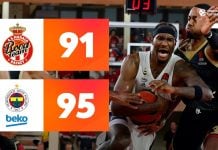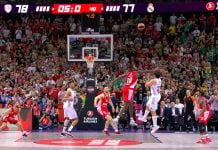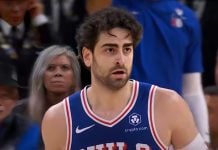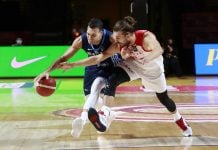Kostas Sloukas is back to his native Greece in order to provide the National Team with a solid backcourt option en route to the 2019 FIBA World Cup in China.
The 29-year-old point guard will be one of coach Thanassis Skourtopoulos’s main choices, either substituting or playing alongside Nick Calathes. Furthermore, Sloukas was one of the most talked-about players in European basketball this summer, especially in Greece and Turkey, even after he chose to renew his contract with 2017 Euroleague champions Fenerbahce Istanbul.
The experienced guard never denied that he had an offer from Olympiacos Piraeus in order to return (played there until 2015), but always added that the Turkish team was a no-brainer for him. One of the dimensions that added up to his decision to stay in Turkey, apart from the presence of Zelimir Obradovic and the great working conditions, had to do with the “series of unfortunate events” taking place in Greek basketball in 2019. Powerhouses Olympiacos and Panathinaikos forfeited games as a means to very controversial ends, thus culminating an atmosphere of fanaticism and overall degradation of an already feeble and shaky domestic league.
In his interview with TalkBasket.net, Kostas Sloukas explained how Greece can be successful at the World Cup and confirmed what Fenerbahce GM Maurizio Gherardini had said about him nine months ago.
Q: Did you have the time to rest a little before you joined the Greek NT?
A: This year was very demanding. I rested a little, mostly in the mental part and by extension also physically. What we’re starting now and trying to do is above everything else. This means that at once we forget about fatigue and everything and play our hearts out for the National Team.
Q: You had some contacts with the National Team’s officials in Turkey, including meetings and discussions. What was the general outline?
A: I talked to coach Skourtopoulos and other delegates who visited me. First of all, we owe a big “thank you” to the guys who performed well at the qualifying stage and right now we’re here, talking about the World Cup. More generally, the atmosphere is positive and, as our coach said, there are only positive thoughts. The roster is very good and this year we have the best player in the world with us (Giannis Antetokounmpo). The expectations are very high, but the determining factor for us is to mix up on the court in the best way possible.
Q: How can this be achieved?
A: It can be done through training, through the daily communication that we have and also through the quality and experience that we have. Of course, it is the job of the coaching staff to succeed as best as possible in preparing us for the first game.
Q: Do you think that for Greece it is important to end the bad streak after a decade of unsuccessful results?
A: There is no “must”. I look at each event separately. Considering the past few years, you can be rest assured that the players of the National Team gave everything they had to make good things happen. We came up short, for various reasons, even though some good opportunities were wasted. One of them was at the EuroBasket quarter-final game against Russia, two years ago. Still, we’re here and moving on. Personally, I can say that a great distinction with the NT is something that I lack in my career.
Q: What was missing from Greece? Was it the winning mentality at some knock-out games?
A: No. All players are winners, most of them have won the Euroleague and have distinguished themselves with their teams in domestic leagues. I think timing and luck play a significant part in these tournaments. Let’s hope this year we have luck on our side.
Q: Have you looked at any future match-ups?
A: Not at all. I’ve only looked at our group. We want to finish first. That is our goal and I believe it is possible.
Q: What do you think of it?
Q: It’s a peculiar group. I think Montenegro and Brazil are the strongest teams, but New Zealand is a really close-knit team because their players have been playing together for years.
Q: Which is your realistic goal at the World Cup?
A: To qualify for the Olympics. That is to say, we should be in a competition next year. Our mind, of course, may be running a little further than that, but the main goal is this. For that to happen, we need to be in the 6-7 best teams.
Q: Was it an easy decision for you to stay with Fenerbahce?
A: It was the best possible choice. It didn’t trouble me particularly. We have accomplished a lot of things with my teammates in the last four years. Having the best coach in Europe and the fans supporting us too, I think the decision was pretty much easy.
Q: Was there any chance of you returning to Greece?
A: It may have crossed my mind in general, but I think the best option was to stay there. This year, I had some thoughts of coming back to Greece, but the truth is that they came and went – quickly.
Q: Do you feel relieved that you can keep a distance from some unpleasant situations that happen in Greek basketball?
A: That’s for you to decide. Not long ago, two of the best teams in Europe (Panathinaikos and Olympiacos) in recent years, chose not to appear on the court and play. My job is to play on the court. I’m at my best age, I want to play, I want to be a star. I wouldn’t like to comment any further. We’re talking about two extraordinary teams that have achieved incredible things. I’m proud to be Greek, but the best for me is to stay with Fenerbahce, and that’s what I did.
Q: In your view, the decision of a team to forfeit a game is one of the worst things that can happen to an athlete?
A: That’s other people’s business. The presidents of the two teams made a decision and the players decided to follow it. My job is to follow the instructions of my coach and my team. I’m very happy at Fenerbahce.
Q: Is Fener’s goal to win the Euroleague?
A: The target is the Final Four. It’s our main goal every year. I think that our roster might be a bit better than last year. The season ended badly, for various reasons, so our motivation is even greater.
Q: Do you believe that we’re about to see a Euroleague competition of unprecedented quality next year?
A: I think so. First of all, the fact alone that the Euroleague has 18 teams makes it much more demanding and difficult. In Fener we had two players leaving for the NBA, while we’re seeing also the opposite trend: players coming from the US to Europe. The truth is that this year there’s a continuous “come and go” between the two continents.

















